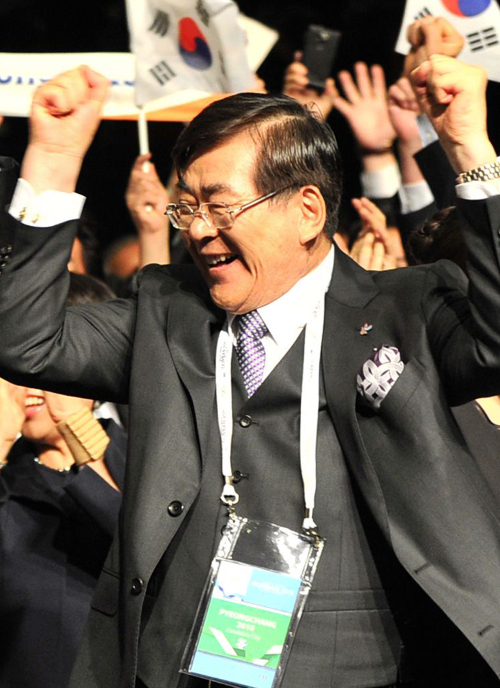PyeongChang bid chief credits teamwork, marketing strategies
They say there’s no “I” in team. PyeongChang, a South Korean alpine town, overwhelmed two European rivals to win the bid for the 2018 Winter Olympics last week due to a team effort and effective delegation of responsibilities, said the chief of the bidding committee.
“At the end of the day, it wasn’t just one person, but many individuals who came together and worked hard behind the scenes,” Cho Yang-ho, chairman of the bidding team, said in an interview with Yonhap on Tuesday.
“The government and local corporations offered great support,” Cho added. “You can’t do it all by yourself. It had been difficult over the two years (as the bid chairman) to bring people together, but the result made it all worthwhile.”

PyeongChang bid chief Cho Yang-ho (Yonhap News)
PyeongChang, some 180 kilometers east of Seoul in Gangwon Province, earned 63 of a possible 95 votes in an International Olympic Committee election last Wednesday in Durban, South Africa. Munich of Germany, considered a strong rival, earned just 25, while Annecy of France had seven. PyeongChang had lost two earlier bids to Canada’s Vancouver and Russia’s Sochi.
Cho, who is also the chairman of a local conglomerate Hanjin Group, said when he took over the bidding committee two years ago, the early focus was on effective human resources management ― namely, bringing everyone on the same page and delegating responsibilities. The committee was made up of employees from the Gangwon provincial government; Korean Air, an affiliate of Hanjin Group; the Korean Olympic Committee; and cabinet ministries such as the ministry of culture, sports and tourism, and the ministry of foreign affairs.
“We all had a common goal of trying to win the bid, and it was important to capitalize on strengths, and not dwell on weaknesses,”
Cho said. “And I tried to think of my own strengths that I could offer. I made most of my know-how in service and personal networks I’ve built over the years as a corporate chairman.”
Cho said lessons learned from the two failed bids also forced the bidding committee to alter its focus and introduce new marketing strategies. He said the two earlier bids were considered “too political,” because they were centered on the possibility of an Olympic Games bringing peace to the divided Korean Peninsula.
“We had to try to persuade IOC members, rather than plead with them for support,” Cho said. “Hosting an Olympic Games isn’t just about who you know in sports. It can depend on the interest of individual IOC members, their countries, or their Olympic committees.”
Cho said it was important to clearly identify PyeongChang’s strengths and weaknesses before approaching IOC members and to package and deliver its message more effectively than its competition.
“Frankly, the Taebaek Mountains (a range surrounding PyeongChang) are no match to the Alps in terms of hardware,” Cho said. “But you don’t always need the Alps or the Rockies for the Olympics. Our PR strategy was to shape our bid to better fit the interests of the IOC members.”
Cho said the successful bid was also aided by young athletes.
Kim Yu-na, the reigning Olympic figure skating champion, stood out as a presenter. But there were others, such as Moon Dae-sung, an IOC member and former Olympic taekwondo gold medalist, and Kang Kwang-bae, a four-time Winter Olympian, who worked behind the scenes.
“Their networking with IOC members made a major contribution,” Cho said. “They didn’t get much spotlight, but I think these young athletes should be better utilized in the future to help improve our sports.”
The bidding committee will be restructured into the Olympic organizing committee within the next five months. Cho said his obligations as the Hanjin Group chairman will keep him from assuming full-time duties with the organizing committee, but he will be involved to at least some degree. By doing so, he honors PyeongChang’s commitment to the IOC to maintain “continuity” over the next seven years.
As for the chief organizer, Cho said the position will require a wide range of skill sets.
“The person has to have management skills and have an international mindset,” he said. “And the person must also have leadership and negotiating skills. I feel it would have to be an expert in business management, not in sports administration.”
(Yonhap News)






